March 21st – April 12th, 2005
This second visit of Emha Ainun Nadjib and Kiai Kanjeng to the United Kingdom was on the invitation of The Muslim News to lend a unique cultural performance to the presentation of awards to Muslim achievers of excellence in various fields that included medical science, sports, the sciences, economics and the arts in Europe.
The Muslim News Awards for Islamic Excellence
London, Wednesday, March 23rd, 2005
The Muslim News Awards for Excellence 2005 were held before an audience of about 600 special invitees at the Ball Room of the Inter-continental Hotel London. In attendance were three leaders of Muslims of Europe, three British cabinet ministers, a number of ambassadors, the award winners themselves and Chancellor Gordon Brown. As Chancellor of the Exchequer, Brown is second in importance in the UK only to Prime Minister Tony Blair. Following opening comments, which were made by several speakers, and the presentation of the awards, Novia Kolopaking led a stunning performance by Kiai Kanjeng.
Kiai Kanjeng had arranged their music specifically for the occasion. The Awards Committee had asked Kiai Kanjeng to present two Qur’anic recitalists to open the concert. Two of their vocalists, Nia Kurniawati and Yuli Astutik, complied with the request. Yuli recited a passage from Islam’s Holy Book prosaically in the murattal style, while Nia recited hers beautifully in the qiroah style, poetically, befitting her status as the Second National Champion.
Immediately thereafter Kiai Kanjeng started their performance with a long musical composition entitled Tasbih Music. A tasbih is a set of prayer beads, much like a rosary, used by Muslims to count their repetitions of dzikir phrases, or utterances in remembrance of Allah. The music comprehensively explored various phenomena: musical elements from the east and the west, from both the traditional and the modern. There were also poetry readings in English by Novia Kolopaking, a number of wirid (chants), several shalawat (songs in praise of the Prophet Muhammad) and a section of terbang rancak (music with tambourine-like instruments). Kiai Kanjeng’s performance also included excerpts from the dynamic songs of legendary Egyptian songstress Ummi Kultsum, the adzan (or Islamic call to prayer) and other mucsical numbers. The vocalists for the performance consisted of Islamiyanto, Imam Fatawi, Nia Kurniawati and Yuli Astutik.
Novia Kolopaking read the poems Bow to Allah, If a Stone is Laying on the Street and Prostrate Yourself and sang Heart Healing and Longing for Thou in a series of arrangements made specifically by Kiai Kanjeng for the occasion, the presentation of awards to sixteen Muslims for outstanding achievement in Europe. The awards were conferred to achievers in medical and other sciences, social service, even sports. Danny Williams, a Muslim boxer who knocked Mike Tyson out in round four was among award recipients that evening.
The Indonesians in the audience probably remembered how Danny William had prostrated himself after having knocked out Tyson, approached him, hugged him and said, “I did not defeat you. It was you who handed me the victory.” It was a comment from a champion mixed with religious modesty. Danny did not feel himself to have won, so he did not suffer “big-headedness” as a result of the victory. When he received the award he made a short speech:
“I am very amazed at receiving this award because when I defeated Tyson I was not very serious about my victory.”
Reporting from the UK, the group wrote at the time that their performance had been ‘unusual’. They ascribed this to two key reasons. Firstly, they were concerned that they would be performing before an audience that included two groups potentially unfavourable towards Islamic music. On one hand there there were Muslims who consider music to be taboo in Islam and on the other, there were westerners whose opinions were informed by a mass media that often portrayed Islam as exclusive and who potentially may have been prejudiced against it.
Secondly, their performance had been led by a woman; and a woman in the later stages of pregnancy. At the conclusion of the performance a number of Muslim women community leaders, including a number from Africa, hugged Novia, saying they were excited and very proud of her, calling her “a woman who exercised her leadership without conflict”. She received a rousing appreciation and applause from the audience.
Unusual? Yes, perhaps. Controversial? Maybe. But groundbreaking? Definitely.
The musical presentation of Kiai Kanjeng could be considered pioneering in many other respects. For example, there were Kiai Kanjeng’s global musical explorations, their unique and intelligent arrangements and the sheer artistic courage required to advance cultural creativity among Muslims. In a substantial sense, the efforts of Kiai Kanjeng were truly phenomenal.
This was the first time, in five years of annual award presentations, that a musical group from Indonesia had been invited to this prestigious event. It was a historical event. The works of Kiai Kanjeng are not merely pioneering in advancing a ‘new culture’ in the Islamic world, but they have artistic qualities that can be placed on a par with other great musical works of the world. This is amply demonstrated by their concerts during tours of Europe as well as on their earlier tours of Egypt, Malaysia and Australia.
Chancellor Gordon Brown spoke for about 40 minutes after the performance of Kiai Kanjeng and quoted three sayings of the Prophet Muhammad on social cohesion and the importance of tolerance. He said he was very fortunate to have had the opportunity to attend a performance of Indonesian music that promoted such freedom and diversity.
Brown said that the musical expression of Kiai Kanjeng was an example of the “cohesion of a social power” referred to in the saying of the Prophet Muhammad “Almuslimu lilmuslimi kalbunyan yasyuddu ba’dhuhum ba’dla”, a Muslim and another, a man and his fellow man, one and the other are mutually strengthening factors. Furthermore, emphasised Brown “the true community is one where if some of its members are afflicted by illness, the other members feel the pain too”.
He said the diversity of nuances and the cohesion of global pluralism reflected by the pattern of arrangements and the sound of the music of Kiai Kanjeng aptly picture the ideals we are fighting for and which we should achieve in the world of today and of tomorrow. “Islam,” said Brown, “contains principles of teaching and knowledge that inspire the development of humanity on the earth for the future.”
In addition to Gordon Brown, a further two British cabinet ministers attended the performance and also made speeches prior to presenting the awards. The event was full of customary Islamic phrases such as Assalamu’alaikum (a greeting of peace) and Bismillah (a profession of believers in Allah’s name). There were Muslim leaders from throughout Europe, other British officials, ambassadors and prominent figures from various fields. From Kiai Kanjeng’s perspective, the evening was likened to a fisherman who casts his net wide and is rewarded with a large catch.
Eddy Pratomo, representing the Indonesian Embassy and instrumental in arranging for Kiai Kanjeng to perform in London, said:
“All in all this is not just art, it is more than that. This is a fight to for the red-and-white (the merah-putih or national flag of Indonesia)…that political diplomacy should be expanded to include cultural diplomacy as Emha Ainun Nadjib and Kiai Kanjeng have demonstrated…a diplomacy that has proven itself capable of attaining objectives and reaching an effectiveness that cannot be achieved by ordinary diplomacy.”
Following the performance, Novia Kolopaking, the leader of the Kiai Kanjeng ensemble, was congratulated by leaders from various countries. Two organizations invited Kiai Kanjeng to visit Britain again.
In addition to shows in Aberdeen, Kiai Kanjeng would also visit Berlin, Rome, Naples and Teramo with the theme:
“Music is the way - smiles without pretence for warmth and friendship that never ends”
Emha wrote from the Italian tour that the last days of Pope John Paul II had been very touching. The congregation had witnessed how the Pope fought hard to entice even the fewest words from his throat and mouth. High on the balcony of the Vatican Palace he succeeded in moving both his hands as high as his head. Actually, wrote Emha, he moved his hands as if in an effort to speak to his congregation.
The Pope struggled several times to say just one or two words. But not a single word came out. Finally he made the sign of the cross, a signal that went straight to the hearts of his people; and much more effectively than any words he could have said. Then, he was taken away to receive intensive care. That was the start of his long journey to the hereafter, the true, eternal life, free from the illusory material world.
“I don’t want to go on discussing death, since almost everyone thinks that death is real, the way worldly life is. Now Pope John Paul II understands exactly which is more real: death, or life after death, or the worldly life. We have not reached the Pope’s state. We are still indulging ourselves, even deluding ourselves in speculation as to the nature of life and death. And, in our speculation, we do not forego the foolish acts of stealing, tackling others, hating others, envying the good fortune of others, and these foolish acts we persist in doing until the very last minutes of our lives when we enter the agony of death.”
Emha wrote that the Pope was a figure of morality, not one of politics. The Papacy may be likened to the Council of Fatwa (Religious Council) in Islam. In the world of Shia, an Ulama or Muslim cleric may attain the rank of Mullah, then of Hujatul Islam and finally even, Ayatollah, the highest rank of leadership in Shia Islam, such as the Ayatollah Khomeini.
Emha had been very impressed by the moral strength and personality of this Pope, who had once been Karol Wojtyla from Poland, a witness to the cold war in the Eastern Bloc, who in the few last decades expounded his views on universal humanitarian issues, international politics, the map of global conflicts and the crucial problems of the world, including those involving Islamic peoples.
Millions of young people felt an affinity of the heart with this Pope. It seems that they are closer to Pope John Paul II than they are to their own religions. It was as if the Pope was able to give them greater enlightenment than that afforded by their own faiths. This closeness, this love, was demonstrated when millions of people flocked to Rome to attend his funeral.
Emha would later write that in his opinion, the show at the Conservatorio Di Musica San Pietro A Majella, Naples, could be called the climax of all performances given by Kiai Kanjeng in this second tour of Europe.
In London he wrote they had worked hard to ‘tame’ their creativity in order to properly address the international air of Islamophobia that they perceived to be a dominant cultural force. In Aberdeen they devoted their talents to building the human and cultural relationship between the Indonesian and the Scottish peoples. In the World Hall of the German Foreign Office they had adapted their music to afford a sense of political and cultural diplomacy. In Rome they offered their creativity to the beauty of religious tolerance, particularly to the solemn atmosphere following the death of Pope John Paul II.
Just as Kiai Kanjeng arrived in Rome, the Pope fell ill. Prior to the Pope’s funeral Kiai Kanjeng had to leave Rome – after two shows – for the old town of Teramo, for a performance organized by the Mayor. Then, Kiai Kanjeng staged a show in Naples. This climactic show, Emha wrote, was very successful.
“I am afraid nobody would believe it even if it was reported,” he said.
Then, because Rome was closed for the funeral, Kiai Kanjeng had to go to Pescara in order to fly to London. In London the group were only able to stay one night. It was difficult to arrange a further performance as there were appointments arranged with Ahmad Versi from the Moslem News, with Yusuf Islam and with friends from the BBC. Kiai Kanjeng would then travel to Yogyakarta, while Emha was to travel to Aceh to commemorate the 100th day of the tsunami there.
While in Germany, Emha sent an email report back to Indonesia from the computer of Mas Pipit Rukhiyat, “a close friend since our vagabond days in Berlin in 1984-1985”. There, Emha and Pipit discussed the workshop themes:
Eradication of corruption in Indonesia starting with the adaptation of Brazilian and Bolivian models.
Dissemination of an idea of a constitution providing for separation of authority between the State and the Government.
The previous evening, Kiai Kanjeng met the Indonesian community in Berlin in a in a get-together at the Museem Dahlem Theatre where they all exchanged banter, anecdotes and other amusing stories and laughs. Within a few days Kiai Kanjeng would stage a formal show at the auditorium of the Foreign Office where the audience was to include 350 German high officials, ambassadors, and 100 Indonesians.
Strathcona Hall, The Rowett Institute Aberdeen, Scotland, Friday, March 26th, 2005
Cultural Diplomacy in Action
Earlier, Kiai Kanjeng and Emha had performed in Aberdeen, Scotland. This was the headline that opened press materials:
World famous Indonesian Gamelan band performs at Aberdeen’s Rowett Institute to raise funds for the Indonesian Children’s Relief Appeal
Publicity materials reported that the 15-strong Kiai Kanjeng Gamelan group were to perform two concerts at Aberdeen’s Rowett Research Institute on Saturday March 26th, 2005in aid of the Indonesian Children's Relief fund for the orphaned children of Aceh, Indonesia (recently struck by the Asian Tsunami).
The concerts were performed in front of an audience of Aberdeen’s Indonesian community and associated members of the Scottish research community. Tickets were limited and very quickly sold out. According to the publicity materials:
“…the group use traditional Javanese percussion to perform a range of songs and music including pop, blues, jazz and even Chinese music. The group also performs poetry and prayers. Kiai Kanjeng are on their second European tour which includes concerts in Berlin, Rome, Naples, Turin and London. Saturday’s concert at the Rowett Institute is being sponsored by the Indonesian Embassy in London.”
Dr Rusmana Ningrat, who had organized the event, is a research scientist at the Rowett Research Institute. He said:
“This concert is a very exciting event for Aberdeen’s Indonesian community and all our friends. I think that one of the reasons the Indonesian Embassy has supported it is in recognition of the large amount of aid which has already been raised by the people of Aberdeen to help the victims of the Tsunami. We are very grateful to the Rowett Institute for allowing us to hold the concert in Strathcona Hall, which was originally built to foster links between Rowett scientists and colleagues working overseas."
Emha concluded this report by writing that there were “many lessons to learn” from the European tour, of the various ‘mysteries and unusual events’ experienced during the tour; the temperatures, the weather, and the necessity of transporting the large volumes of equipment required by Kiai Kanjeng; of the performance at the Conservatory, the Mecca of classical music, of Naples and of the situation following the death of Father Karol Wojtyla or Papa John Paul Secundo.
In Aberdeen, Scotland, Europe’s oil capital, it could be clearly felt that the arrival of Kiai Kanjeng was not just a major arts event but a cultural and humanist event, and essentially a political event too in that it had substance, both implicit and explicit.[1]
The presence of Kiai Kanjeng allowed those Scots who attended to immerse themselves in the enjoyment of inter-cultural exchange and humanity, which made all kinds of political sentiments about ‘Indonesia’ and the psychological issue of “Islamophobia” appear trivial and unimportant. The atmosphere in the forum demonstrated the ‘global intimacy’ that could be achieved among people without the barriers of nationality, politics, religion or anything else for that matter.
“World politics is breaking up the global community,” said Emha. “Economic capitalism reduces people to fundamental ideologies and a range of mainstream values that drive divisions between them, estranging them behind artificial barriers. But in our music this evening we will discover the enjoyment of being together”.
Emha gave the example of bagpipe music, an important component of traditional Scottish culture. Renowned piper Mr. Duncan McPherson had accompanied Kiai Kanjeng in their rendition of Amazing Grace. Kiai Kanjeng had seamlessly taken up the melody without altering the notation, pitch or key, and used it as the basis for a medly of traditional songs from Madura (East Java), Aceh and Timor.
Aesthetically speaking, it was clear that the distance between the East and the West was, in musical terms, a minor one. Kiai Kanjeng were able to find connections between and unity among cultures from all over the world. It was very easy for Kiai Kanjeng to perform the traditional Scottish song Auld Lang Syne because the melody had already been adopted by the communities of Indonesia. The material prepared for Kiai Kanjeng’s performances for audiences in Germany and Italy, where they were due to travel next, was just as well prepared.
The audience for Kiai Kanjeng’s performance in Aberdeen’s Rowett Institute Strathcona Hall was almost entirely Scottish, though there were a number of Indonesians present who were resident in Aberdeen. The performance was divided into afternoon and evening slots so that as many as possible would have the opportunity to attend. The Indonesians who were able to attend, aside from those on the organising Committee, included students or oil company employees. They were joined by friends, many of whom had made a special trip from Glasgow or Edinburgh in order to attend.
This second visit of Emha Ainun Nadjib and Kiai Kanjeng to the United Kingdom was on the invitation of The Muslim News to lend a unique cultural performance to the presentation of awards to Muslim achievers of excellence in various fields that included medical science, sports, the sciences, economics and the arts in Europe.
The Muslim News Awards for Islamic Excellence
London, Wednesday, March 23rd, 2005
The Muslim News Awards for Excellence 2005 were held before an audience of about 600 special invitees at the Ball Room of the Inter-continental Hotel London. In attendance were three leaders of Muslims of Europe, three British cabinet ministers, a number of ambassadors, the award winners themselves and Chancellor Gordon Brown. As Chancellor of the Exchequer, Brown is second in importance in the UK only to Prime Minister Tony Blair. Following opening comments, which were made by several speakers, and the presentation of the awards, Novia Kolopaking led a stunning performance by Kiai Kanjeng.
Kiai Kanjeng had arranged their music specifically for the occasion. The Awards Committee had asked Kiai Kanjeng to present two Qur’anic recitalists to open the concert. Two of their vocalists, Nia Kurniawati and Yuli Astutik, complied with the request. Yuli recited a passage from Islam’s Holy Book prosaically in the murattal style, while Nia recited hers beautifully in the qiroah style, poetically, befitting her status as the Second National Champion.
Immediately thereafter Kiai Kanjeng started their performance with a long musical composition entitled Tasbih Music. A tasbih is a set of prayer beads, much like a rosary, used by Muslims to count their repetitions of dzikir phrases, or utterances in remembrance of Allah. The music comprehensively explored various phenomena: musical elements from the east and the west, from both the traditional and the modern. There were also poetry readings in English by Novia Kolopaking, a number of wirid (chants), several shalawat (songs in praise of the Prophet Muhammad) and a section of terbang rancak (music with tambourine-like instruments). Kiai Kanjeng’s performance also included excerpts from the dynamic songs of legendary Egyptian songstress Ummi Kultsum, the adzan (or Islamic call to prayer) and other mucsical numbers. The vocalists for the performance consisted of Islamiyanto, Imam Fatawi, Nia Kurniawati and Yuli Astutik.
Novia Kolopaking read the poems Bow to Allah, If a Stone is Laying on the Street and Prostrate Yourself and sang Heart Healing and Longing for Thou in a series of arrangements made specifically by Kiai Kanjeng for the occasion, the presentation of awards to sixteen Muslims for outstanding achievement in Europe. The awards were conferred to achievers in medical and other sciences, social service, even sports. Danny Williams, a Muslim boxer who knocked Mike Tyson out in round four was among award recipients that evening.
The Indonesians in the audience probably remembered how Danny William had prostrated himself after having knocked out Tyson, approached him, hugged him and said, “I did not defeat you. It was you who handed me the victory.” It was a comment from a champion mixed with religious modesty. Danny did not feel himself to have won, so he did not suffer “big-headedness” as a result of the victory. When he received the award he made a short speech:
“I am very amazed at receiving this award because when I defeated Tyson I was not very serious about my victory.”
Reporting from the UK, the group wrote at the time that their performance had been ‘unusual’. They ascribed this to two key reasons. Firstly, they were concerned that they would be performing before an audience that included two groups potentially unfavourable towards Islamic music. On one hand there there were Muslims who consider music to be taboo in Islam and on the other, there were westerners whose opinions were informed by a mass media that often portrayed Islam as exclusive and who potentially may have been prejudiced against it.
Secondly, their performance had been led by a woman; and a woman in the later stages of pregnancy. At the conclusion of the performance a number of Muslim women community leaders, including a number from Africa, hugged Novia, saying they were excited and very proud of her, calling her “a woman who exercised her leadership without conflict”. She received a rousing appreciation and applause from the audience.
Unusual? Yes, perhaps. Controversial? Maybe. But groundbreaking? Definitely.
The musical presentation of Kiai Kanjeng could be considered pioneering in many other respects. For example, there were Kiai Kanjeng’s global musical explorations, their unique and intelligent arrangements and the sheer artistic courage required to advance cultural creativity among Muslims. In a substantial sense, the efforts of Kiai Kanjeng were truly phenomenal.
This was the first time, in five years of annual award presentations, that a musical group from Indonesia had been invited to this prestigious event. It was a historical event. The works of Kiai Kanjeng are not merely pioneering in advancing a ‘new culture’ in the Islamic world, but they have artistic qualities that can be placed on a par with other great musical works of the world. This is amply demonstrated by their concerts during tours of Europe as well as on their earlier tours of Egypt, Malaysia and Australia.
Chancellor Gordon Brown spoke for about 40 minutes after the performance of Kiai Kanjeng and quoted three sayings of the Prophet Muhammad on social cohesion and the importance of tolerance. He said he was very fortunate to have had the opportunity to attend a performance of Indonesian music that promoted such freedom and diversity.
Brown said that the musical expression of Kiai Kanjeng was an example of the “cohesion of a social power” referred to in the saying of the Prophet Muhammad “Almuslimu lilmuslimi kalbunyan yasyuddu ba’dhuhum ba’dla”, a Muslim and another, a man and his fellow man, one and the other are mutually strengthening factors. Furthermore, emphasised Brown “the true community is one where if some of its members are afflicted by illness, the other members feel the pain too”.
He said the diversity of nuances and the cohesion of global pluralism reflected by the pattern of arrangements and the sound of the music of Kiai Kanjeng aptly picture the ideals we are fighting for and which we should achieve in the world of today and of tomorrow. “Islam,” said Brown, “contains principles of teaching and knowledge that inspire the development of humanity on the earth for the future.”
In addition to Gordon Brown, a further two British cabinet ministers attended the performance and also made speeches prior to presenting the awards. The event was full of customary Islamic phrases such as Assalamu’alaikum (a greeting of peace) and Bismillah (a profession of believers in Allah’s name). There were Muslim leaders from throughout Europe, other British officials, ambassadors and prominent figures from various fields. From Kiai Kanjeng’s perspective, the evening was likened to a fisherman who casts his net wide and is rewarded with a large catch.
Eddy Pratomo, representing the Indonesian Embassy and instrumental in arranging for Kiai Kanjeng to perform in London, said:
“All in all this is not just art, it is more than that. This is a fight to for the red-and-white (the merah-putih or national flag of Indonesia)…that political diplomacy should be expanded to include cultural diplomacy as Emha Ainun Nadjib and Kiai Kanjeng have demonstrated…a diplomacy that has proven itself capable of attaining objectives and reaching an effectiveness that cannot be achieved by ordinary diplomacy.”
Following the performance, Novia Kolopaking, the leader of the Kiai Kanjeng ensemble, was congratulated by leaders from various countries. Two organizations invited Kiai Kanjeng to visit Britain again.
In addition to shows in Aberdeen, Kiai Kanjeng would also visit Berlin, Rome, Naples and Teramo with the theme:
“Music is the way - smiles without pretence for warmth and friendship that never ends”
Emha wrote from the Italian tour that the last days of Pope John Paul II had been very touching. The congregation had witnessed how the Pope fought hard to entice even the fewest words from his throat and mouth. High on the balcony of the Vatican Palace he succeeded in moving both his hands as high as his head. Actually, wrote Emha, he moved his hands as if in an effort to speak to his congregation.
The Pope struggled several times to say just one or two words. But not a single word came out. Finally he made the sign of the cross, a signal that went straight to the hearts of his people; and much more effectively than any words he could have said. Then, he was taken away to receive intensive care. That was the start of his long journey to the hereafter, the true, eternal life, free from the illusory material world.
“I don’t want to go on discussing death, since almost everyone thinks that death is real, the way worldly life is. Now Pope John Paul II understands exactly which is more real: death, or life after death, or the worldly life. We have not reached the Pope’s state. We are still indulging ourselves, even deluding ourselves in speculation as to the nature of life and death. And, in our speculation, we do not forego the foolish acts of stealing, tackling others, hating others, envying the good fortune of others, and these foolish acts we persist in doing until the very last minutes of our lives when we enter the agony of death.”
Emha wrote that the Pope was a figure of morality, not one of politics. The Papacy may be likened to the Council of Fatwa (Religious Council) in Islam. In the world of Shia, an Ulama or Muslim cleric may attain the rank of Mullah, then of Hujatul Islam and finally even, Ayatollah, the highest rank of leadership in Shia Islam, such as the Ayatollah Khomeini.
Emha had been very impressed by the moral strength and personality of this Pope, who had once been Karol Wojtyla from Poland, a witness to the cold war in the Eastern Bloc, who in the few last decades expounded his views on universal humanitarian issues, international politics, the map of global conflicts and the crucial problems of the world, including those involving Islamic peoples.
Millions of young people felt an affinity of the heart with this Pope. It seems that they are closer to Pope John Paul II than they are to their own religions. It was as if the Pope was able to give them greater enlightenment than that afforded by their own faiths. This closeness, this love, was demonstrated when millions of people flocked to Rome to attend his funeral.
Emha would later write that in his opinion, the show at the Conservatorio Di Musica San Pietro A Majella, Naples, could be called the climax of all performances given by Kiai Kanjeng in this second tour of Europe.
In London he wrote they had worked hard to ‘tame’ their creativity in order to properly address the international air of Islamophobia that they perceived to be a dominant cultural force. In Aberdeen they devoted their talents to building the human and cultural relationship between the Indonesian and the Scottish peoples. In the World Hall of the German Foreign Office they had adapted their music to afford a sense of political and cultural diplomacy. In Rome they offered their creativity to the beauty of religious tolerance, particularly to the solemn atmosphere following the death of Pope John Paul II.
Just as Kiai Kanjeng arrived in Rome, the Pope fell ill. Prior to the Pope’s funeral Kiai Kanjeng had to leave Rome – after two shows – for the old town of Teramo, for a performance organized by the Mayor. Then, Kiai Kanjeng staged a show in Naples. This climactic show, Emha wrote, was very successful.
“I am afraid nobody would believe it even if it was reported,” he said.
Then, because Rome was closed for the funeral, Kiai Kanjeng had to go to Pescara in order to fly to London. In London the group were only able to stay one night. It was difficult to arrange a further performance as there were appointments arranged with Ahmad Versi from the Moslem News, with Yusuf Islam and with friends from the BBC. Kiai Kanjeng would then travel to Yogyakarta, while Emha was to travel to Aceh to commemorate the 100th day of the tsunami there.
While in Germany, Emha sent an email report back to Indonesia from the computer of Mas Pipit Rukhiyat, “a close friend since our vagabond days in Berlin in 1984-1985”. There, Emha and Pipit discussed the workshop themes:
Eradication of corruption in Indonesia starting with the adaptation of Brazilian and Bolivian models.
Dissemination of an idea of a constitution providing for separation of authority between the State and the Government.
The previous evening, Kiai Kanjeng met the Indonesian community in Berlin in a in a get-together at the Museem Dahlem Theatre where they all exchanged banter, anecdotes and other amusing stories and laughs. Within a few days Kiai Kanjeng would stage a formal show at the auditorium of the Foreign Office where the audience was to include 350 German high officials, ambassadors, and 100 Indonesians.
Strathcona Hall, The Rowett Institute Aberdeen, Scotland, Friday, March 26th, 2005
Cultural Diplomacy in Action
Earlier, Kiai Kanjeng and Emha had performed in Aberdeen, Scotland. This was the headline that opened press materials:
World famous Indonesian Gamelan band performs at Aberdeen’s Rowett Institute to raise funds for the Indonesian Children’s Relief Appeal
Publicity materials reported that the 15-strong Kiai Kanjeng Gamelan group were to perform two concerts at Aberdeen’s Rowett Research Institute on Saturday March 26th, 2005in aid of the Indonesian Children's Relief fund for the orphaned children of Aceh, Indonesia (recently struck by the Asian Tsunami).
The concerts were performed in front of an audience of Aberdeen’s Indonesian community and associated members of the Scottish research community. Tickets were limited and very quickly sold out. According to the publicity materials:
“…the group use traditional Javanese percussion to perform a range of songs and music including pop, blues, jazz and even Chinese music. The group also performs poetry and prayers. Kiai Kanjeng are on their second European tour which includes concerts in Berlin, Rome, Naples, Turin and London. Saturday’s concert at the Rowett Institute is being sponsored by the Indonesian Embassy in London.”
Dr Rusmana Ningrat, who had organized the event, is a research scientist at the Rowett Research Institute. He said:
“This concert is a very exciting event for Aberdeen’s Indonesian community and all our friends. I think that one of the reasons the Indonesian Embassy has supported it is in recognition of the large amount of aid which has already been raised by the people of Aberdeen to help the victims of the Tsunami. We are very grateful to the Rowett Institute for allowing us to hold the concert in Strathcona Hall, which was originally built to foster links between Rowett scientists and colleagues working overseas."
Emha concluded this report by writing that there were “many lessons to learn” from the European tour, of the various ‘mysteries and unusual events’ experienced during the tour; the temperatures, the weather, and the necessity of transporting the large volumes of equipment required by Kiai Kanjeng; of the performance at the Conservatory, the Mecca of classical music, of Naples and of the situation following the death of Father Karol Wojtyla or Papa John Paul Secundo.
In Aberdeen, Scotland, Europe’s oil capital, it could be clearly felt that the arrival of Kiai Kanjeng was not just a major arts event but a cultural and humanist event, and essentially a political event too in that it had substance, both implicit and explicit.[1]
The presence of Kiai Kanjeng allowed those Scots who attended to immerse themselves in the enjoyment of inter-cultural exchange and humanity, which made all kinds of political sentiments about ‘Indonesia’ and the psychological issue of “Islamophobia” appear trivial and unimportant. The atmosphere in the forum demonstrated the ‘global intimacy’ that could be achieved among people without the barriers of nationality, politics, religion or anything else for that matter.
“World politics is breaking up the global community,” said Emha. “Economic capitalism reduces people to fundamental ideologies and a range of mainstream values that drive divisions between them, estranging them behind artificial barriers. But in our music this evening we will discover the enjoyment of being together”.
Emha gave the example of bagpipe music, an important component of traditional Scottish culture. Renowned piper Mr. Duncan McPherson had accompanied Kiai Kanjeng in their rendition of Amazing Grace. Kiai Kanjeng had seamlessly taken up the melody without altering the notation, pitch or key, and used it as the basis for a medly of traditional songs from Madura (East Java), Aceh and Timor.
Aesthetically speaking, it was clear that the distance between the East and the West was, in musical terms, a minor one. Kiai Kanjeng were able to find connections between and unity among cultures from all over the world. It was very easy for Kiai Kanjeng to perform the traditional Scottish song Auld Lang Syne because the melody had already been adopted by the communities of Indonesia. The material prepared for Kiai Kanjeng’s performances for audiences in Germany and Italy, where they were due to travel next, was just as well prepared.
The audience for Kiai Kanjeng’s performance in Aberdeen’s Rowett Institute Strathcona Hall was almost entirely Scottish, though there were a number of Indonesians present who were resident in Aberdeen. The performance was divided into afternoon and evening slots so that as many as possible would have the opportunity to attend. The Indonesians who were able to attend, aside from those on the organising Committee, included students or oil company employees. They were joined by friends, many of whom had made a special trip from Glasgow or Edinburgh in order to attend.
The multispectrum values demonstrated by Kiai Kanjeng’s performance created a range of atmospheres for the possibility of dialogue, for the enhancement of purity in politics, for greater human warmth and the appreciation of one another’s culture, where everyone was dancing together to dangdut and Melayu (Malay) music.
Professor Richard Lea, a world-class scientist and one of leaders of the Rowett Institute was one of the most enthusiastic dancers, immersing himself in the atmosphere of intercultural relationships. He said that: “It’s not possible that I’m not going to Indonesia now. I have to go there to feel the warmth of Indonesia myself…”
The two shows in Aberdeen were examples of the effectiveness of ‘People to People’ relationships. A warm atmosphere was created between peoples of different nationalities, skin colours, backgrounds, cultures and religions. The variety of music presented by Kiai Kanjeng, the comprehensiveness of their approach through dialogue during performances and the informal meetings held outside the performance were very effective in serving as a spearhead for Indonesia’s Cultural Diplomacy. In Aberdeen, the oil capital of Europe, it was apparent that the visit of Kiai Kanjeng was primarily not an arts event, but rather a cultural one.
The presence of Kiai Kanjeng afforded the Scottish audience the pleasure of cultural and human communications that served to sweep away any prejudices about Indonesia. The performances demonstrated the ‘global intimacy’ that can be achieved between peoples in the absence of national, political, religious and any other restrictions.
The concerts were held to raise relief aid for the victims of the Asian tsunami. According to Rusmana Ningrat, chairman of the organizing committee, immediately after the news of the tsunami in Aceh reached Scotland, the Indonesian community there started activities to collect aid to relieve the sufferings of the victims. The goods collected amounted to two container-loads, which were sent to Indonesia to arrive in April 2005. The goods consisted of blankets, clothing, school equipment, medicines and other necessities.
Julie Fraser, who with her husband Gary collected donations from donors in Aberdeen, said she was delighted to be able to help the Indonesian community in Aberdeen. “We visited supermarkets to solicit the aid,” she said, adding that when loading the goods to the containers, Aberdeen school students had helped.
A mixed audience of Indonesians resident in Aberdeen as well as interested locals attended the afternoon performance, at 2.00pm. Professor Rusmana Ningrat of the organising committee announced to the audience that the performances were in support of Indonesian Children’s Relief in cooperation with the Indonesian Embassy in London. The proceeds were to go to victims of the recent tsunami in Aceh.
The modus operandi during this first night of the show in Aberdeen was similar to that employed in the Maiyah gatherings in Indonesia, i.e., the deliberate integration of each number in the performance to balance the aesthetics, the practice of combining the gamelan with the discipline of western music and then “contextualising” the results with cultural and political themes based on the lyrics of the song being performed.
Kiai Kanjeng invited the audience to interact with the performers both in dialogue and in the music. Novia Kolopaking frequently descended from the stage and invited the audience to sing. One church choir singer with an operatic voice began to sing Silent Night as soon as Kiai Kanjeng broke into the tune with their gamelan instruments, and was then joined by Kiai Kanjeng as they intoned their Arabic version in the form of a Shalawat, or song in praise of the Prophet Muhammad. Similar enthusiasm met Kiai Kanjeng when they played traditional Scottish folk songs.
For the 7.00pm evening show, Duncan McPherson’s bagpipes opened the performance with Amazing Grace, accompanied by the saron and bonang instruments of Kiai Kanjeng as they merged seamlessly into the song. This combination served as a warm and familiar “hello” that succeeded in winning the attention of the audience.
The show was all about breaking down borders. Every song was greeted with enthusiastic cheers and applause. This time, Emha was playing ‘himself’, wrote one observer, right from the opening moments and accompanied by the MC and his wife, Novia Kolopaking. His jokes, which were translated only with difficulty, served to warm up the audience. When a traditional Indonesia dangdut tune was played, sung by vocalists Yuli Astutikm, Imam Badawi and Imam Fatawi, the audience spontaneously gyrated along with it.
Emha has said that “world politics fragment human beings…the capitalist economy divides people into strata and ideological discourse, while mainstream values serve to further divide people, alienating them from each other behind walls of difference. But in the musical performance this evening we find and enjoy how people can unite in love.”
Emha was able to illustrate his point ably. After a rendition of “Amazing Grace” on the bagpies, performed by Duncan McPherson, Kiai Kanjeng picked up the tune without changing a note or key, performing a bridge into a rendition of Madurese, Acehnese and East Timorese songs. The medley was proof that aesthetically, there existed no serious “distance” between oriental and occidental music. Kiai Kanjeng have found the connection and unity possible between the cultural wealth of peoples in different parts of the world.
For example, Kiai Kanjeng were able to play the traditional Scottish song Auld Lang Syne as the song is familiar to Indonesians of various backgrounds: the public, the “keraton’ (the royal courts of Yogyakarta and Solo in Java), the Muhammadiyah mass-Muslim movement etc. Numbers with similar adaptability were also prepared by Kiai Kanjeng for their subsequent shows in Germany and Italy. One member of the audience who attended the evening performance, Corrinne Lea, a French woman who lives in Aberdeen, remarked: “It’s incredible, fantastic.”
In the show Emha also took the lead in singing Gundul-gundul Pacul, a traditional children’s song from rural East Java. He explained that the song, while light-hearted in mood, actually has a very deep and philosophical meaning:
“Gundul-gundul pacul gembelengan, nyunggi-nyunggi wakul gembelengan, wakul nglimpang segane dadi sak latar, wakul ngglimpang segane dadi sak latar”.
Freely interpreted, it reads:
A bald-headed boy nicknamed Gundul Pacul is walking swaggeringly carrying a basket of cooked rice on his head. But his swaying gait causes the basket to fall and scatter the rice all over the ground.
Emha Ainun Nadjib interpreted the song to mean that the boy carrying the basket of cooked rice is an allegory, where a man bears weighty responsibility, but rather than exercising his responsibilities he shows off the trappings of his office instead. Likening the story to the situation facing Indonesia and Indonesians today, and particularly with regard to those bearing heavy responsibilities, such as Presidents, the result is disaster: “the rice falls and scatters.”
Novia Kolopaking also sang Wild World, originally by Cat Stevens, now Yusuf Islam. The gamelan version was very well received by the audience, many of who were fans of Cat Stevens. Then she sung Brian Adams’ Everything I do. Kiai Kanjeng also played their rock-style numbers, such as Fatamorgana, one of their most popular songs in Indonesia.
Emha reminded the audience that Novia was not so much a member of Kiai Kanjeng as an assistant and vocalist for she was an established artist and film actress in her own right with many hit albums to her credit. Novia sang Bunga Mawar (Rose), a hit from her 1995 album.
Emha himself seldom appeared in the show, remaining back stage most of the time. He appeared only for the presentation of certain works, such as Tombo Ati, a song whose title suggests a cure to what ails the heart, namely in prayer, reading the Qur’an and other devotions. It was dedicated to organiser Uda Oz, a fond, regionally-tinged name for Professor Rusmana Ningrat who was from the Padang area of West Sumatra. The song was accompanied by Minang (Padang-style) instruments.
Tombo Ati was really a very significant breakthrough song for Emha back in the early 1990’s and was very important in bringing in a new and expanded audience for Kiai Kanjeng, including by way of numerous TV appearances on Indonesia’s many new private TV channels.
Duncan McPherson was on hand to conduct children wearing Indonesian costumes. Their performance was followed by Kenduri Shalawat, or Feast of Shalawat: a medley of songs in praise to Prophet Muhammad, with the accompaniment of Acehnese instruments.
Kiai Kanjeng’s profile as a ‘people’s’ orchestra started as a result of the Kedung Ombo Dam tragedy in the early 1990’s where the inhabitants of a number of villages West Java were refused their right to government resettlement when their area was to be flooded for the development of a new dam project, Kedung Ombo dam. Emha explained that it was as a result of this ‘protest’ that Kiai Kanjeng can more appropriately be called “cultural workers” than musicians, cultural workers who can identify themselves with any community, any university, with any people or the followers of any religion.
Emha explained that the context of Kiai Kanjeng’s music is to reveal and build upon cultural relationships and relationships between people, where music is the spearhead of communication. The Kiai Kanjeng gamelan orchestra had been established “unintentionally.” Emha had been a writer who had become involved in the Kedung Ombo affair.
“I helped the victims to a very high degree,” he said. It resulted in the writing of a drama entitled “Pak Kanjeng” which was to be performed with gamelan musical accompaniment by Novi Budianto’s company, who applied an unconventional notation. Later it would also be published as a novel.
This unconventional notation was later extended to other performances, for example when accompanying Emha’s poetry readings. In this way the name Pak Kanjeng became synonymous with Novi Budianto’s gamelan company, and the name was changed to Kiai Kanjeng. In Javanese culture, anything venerated by the people is called “kiai”. The central character of Pak Kanjeng was in fact modelled on an actual person in Kedung Ombo, a man named Pak Jengot, or the Bearded Old Man.
During the Soeharto years the staging of Pak Kanjeng was banned. Fortunately, this forced Emha and Kiai Kanjeng to become even more resourceful in their ideas. Emha took his artistic fight into the realms of poetry and musical performances. The strategy was successful, perhaps reaching greater numbers of people than would have been possible had the Pak Kanjeng ban not been applied. The poetry and musical performances were able to escape political restrictions and success was both assured and enduring. Since then, it has been the deliberate policy of Emha and Kiai Kanjeng to reach as many peoples and communities as possible with their music and poetry, accommodating all circles and interests. They have never been short of invitations.
Their audiences in Indonesia are made up of various social groups and strata: from street-vendors, prostitutes and pedicab drivers to santri (people educated at Islamic boarding schools, or other institutions of Islamic higher learning etc), young executives and members of the upper class. The santri are attracted to the Islamic nuances in Kiai Kanjeng’s musical inventory and to Emha’s writings. The lower classes: to his sense of social justice and support for the wong cilik or little
In order to accommodate the interests and demands of as many communities as possible, Emha makes a point of “talking in the language of the community where Kiai Kanjeng is performing”, be it a mass gathering in a car park or field attended by workers or farmers, a student group or a meeting with high-ranking government officials. According to Emha, the early impetus for Kiai Kanjeng was to protest and rebel against all that was wrong in politics in Indonesia. He once said:
“Originally it was rebellion…the people cannot be enslaved forever.”
But he went on to concede that rebellion must be conducted through the right channels, and “sanctioned” by the public. It cannot be done for their mere sake of rebellion. Kiai Kanjeng and Emha took it upon themselves to increase the level of political education to the entire public through their music. Now, long after those early statements of protest and rebellion, Emha and Kiai Kanjeng worked with the support of the Indonesian Embassy in London, and were particularly successful in their brand of cultural diplomacy as demonstrated at the Islamic Awards. Emha himself recognised that the cultural diplomacy there had been very effective.
Observers have occasionally said that Emha and Kiai Kanjeng are engaged in a fusion of gamelan and western and other forms. For the UK tour and in Aberdeen Emha and Kiai Kanjeng had prepared a number of western and middle-eastern songs, such as one entitled Kalimah, originally sung by Majdah Rumi, a Lebanese Christian. In Kiai Kanjeng’s version the Arabic lyric was translated into English and sung as a duet by Yuli and Novia.
The show in Aberdeen concluded with Rampak Osing, a combination of Javanese and Balinese styles that was performed dynamically by the members of Kiai Kanjeng Company. This was followed by Auld Lang Syne, the closing song.
Professor Richard Lea from the Rowett Research Institute had been involved with the preparations for the performance. He described the difficulties in finding a venue sufficiently large for the occasion, commenting that the Strathcona Hall at the Institute had been the only one suitable. He stated that the hall was too small, only admitting an audience of around 100, and for that reason it had been decided to hold two shows.
“We received many telephone calls from people who wanted to attend Kiai Kanjeng’s show,” he said, adding that the organisers had to be mindful of the strict requirements of UK health and safety regulations. After the show, Professor Lea said he had been so impressed that he was determined to travel to Indonesia in order to experience the country and its people for himself.
Rusmana Ningrat spoke for the entire Indonesian community in Aberdeen when he thanked Emha, Novia and Kiai Kanjeng for their performance, which he said had been both interesting and unique. He applauded the participation of well-known Rowett piper Mr. Duncan McPherson and hoped that Emha, Novia and all the members of the Kiai Kanjeng gamelan orchestra were happy with their performance in Aberdeen.
They were.
[1] Source: One Page Report-III Kiai Kanjeng European Tour II 2005 and contributions by Zeynita Gibbons. MAIYAH DOMBA GUNUNG The Gathering of the Mountain Goat

































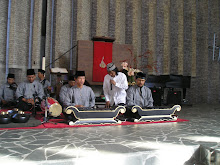
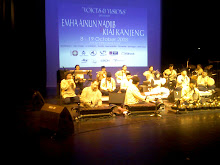

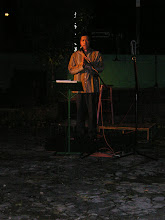



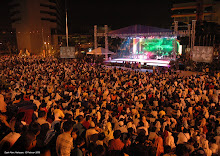
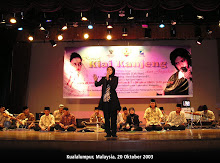
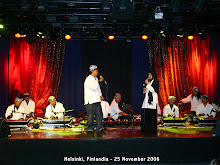.jpg)



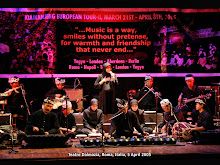


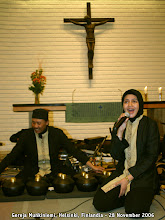.jpg)

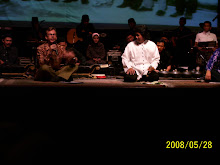.jpg)
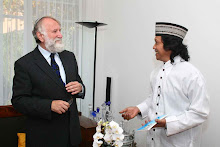
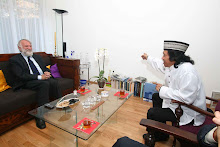
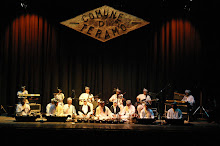


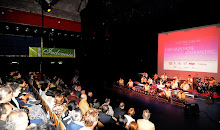

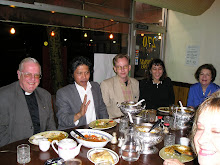


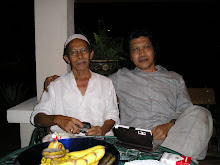
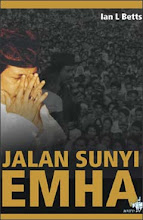
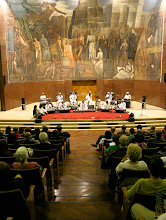
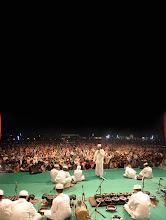

No comments:
Post a Comment